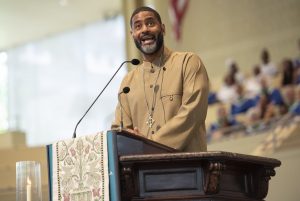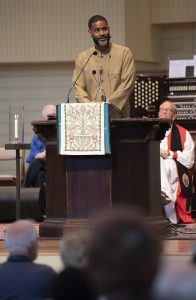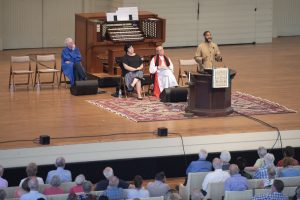
“Neighbor, oh neighbor, this is us,” said the Rev. Otis Moss III at the 9:15 a.m. Monday Ecumenical Service. He told the congregation to look at a neighbor and repeat the sentence. And they did.
Moss’s sermon title was “This Is Us, Part 1,” and the Scripture reading was Judges 11:1-6.
In the OM3 (Otis Moss III) reading of the text, Jephthah was a mighty warrior, the son of Gilead and a prostitute.
“She was a woman who was violated,” Moss said. “Jephthah’s brothers said, ‘You can’t have any of the trust fund because you are the son of another woman.’ ”
So Jephthah left and went to live in Tob with a group of riff-raff, or rebels, according to some translations. The elders of Gilead came to him and asked him to lead their troops against the Ammonites.
Jephthah looked at them and said, “Aren’t you the same guys who pushed me out, and now you want me back?” They answered him, “Yes, but we are going to make you the head of the nation.”
“This is us,” Moss said.
Moss is currently binge watching “This Is Us,” the television show endeared by many.
“I would come home late from church and (my wife) Monica would be crying,” Moss said. “I asked what it was, and she told me this show; her tears mixed joy with sorrow.”
“This Is Us” is the story of three siblings, Kate and Kevin, white twins, and their adopted black brother, Randall; all were born on the same day.
“The show reveals the joy and pain in life, how family can heal and hurt,” Moss said. “There are no villains or heroes. It draws on larger Biblical themes, like ‘Who am I,’ ‘What is my call,’ ‘Who is this person I love to hate and hate to love but just can’t live without.’ ”

Moss told the congregation: “We have horns and halos.”
“We praise God one moment, and curse a child of God the next,” Moss said. “We heap the residue of contradiction on our hearts. The knives carried by family are kept sharper and cut deeper than others.”
Jephthah was a mighty warrior and his father was Gilead, but his mother was not given a name or a connection. Jephthah lived in the purgatory of acceptance and rejection.
“Jephthah’s mother is called a prostitute, but she was a young girl that a man of stature took advantage of,” Moss said. “She was part of the #MeToo Movement before there was a movement.”
Jephthah lived between the pain and the promise. Moss said that was a dangerous place to be “because if you lean into the pain, you might forget the promise.”
Moss told the story of Dorothy Height, head of the National Council of Negro Women for 40 years.
“She had been called to preach, but men told her a woman could not preach,” Moss said. “So she found another way. She leaned into her promise, and when she preached at the Hampton University Ministers’ Conference, I was blown away. I am amazed that people are still saying that women cannot preach. Before Jesus could preach, Mary had to carry him.”
Moss cited a story by Fr. Greg Boyle, of Homeboy Industries, about a former gang member who had tattoos removed from his face. The man had a tear on his face for every person he had shot. He looked at his face after the tattoos were removed and saw the scars that were left.
“I will always remember the pain I caused,” the man said.
Jephthah was “in danger of defining his destiny by his deficits,” Moss said. His own blood was blocking his blessing, and they pushed him out of his own country and he found a home in Tob.
“There is something evil about shame, to be forced to live in the shadows,” Moss said. “There is danger when we are forced to live by someone else’s story. Our nation is allowing other people to shape the story of who we can be, a story of fear instead of possibility.”
Jephthah had great power and authority, and he was delivered because he took a hand in telling his own story.
“Deficit might be divine development,” Moss said. “The rebels in Tob were teaching Jephthah guerrilla warfare. In his exile, he developed into a leader. There is a synchronicity in this time and that allowed Jephthah to grow and be blessed.”
Without Jephthah and his willingness to learn how to fight, Moss said, “there would have been no Samson.”
“If there was no Samson, (there would have been) no Samuel, no Saul, no David, no Solomon, no Isaiah to say ‘unto us a child is born,’ ” he said. “If no Isaiah, then no Matthew, Mark, Luke and John, and we would never hear about Jesus and Calvary and the Resurrection. If there was no Pentecost, there would be no Peter to preach and no Saul to become Paul. And Paul would never have set up churches and there never would have been Origen and Augustine and Thomas Aquinas.”
Without them, Moss said, “there would never have been a Luther and no John Wesley and no Chautauqua and no Joan Brown Campbell, no Robert Franklin, no Gene Robinson, and I would not have been invited to preach.”
See the humor in the text, Moss told the congregation.
“Who came to bring Jephthah back? Moss asked. “The same people who put him out, “he said.” This is God’s divine development, holy mischief. We need to believe and hold tight because God will do great things. God will turn this hellish time into Heaven.”
Moss then turned to the song, “Amazing Grace.”

“Did you know (‘Amazing Grace’) is structured in a pentatonic scale, African music, with European words?” Moss asked. “If you look up the original manuscript in the Library of Congress, it says ‘words by John Newton; melody unknown.’ ”
Newton was a “peddler of human flesh,” Moss said. Newton’s ship was in the middle of a storm, and the story is told that he prayed the words of “Amazing Grace,” and the storm subsided.
“That is not what really happened,” Moss said.
The people in the hull were humming this tune, and the melody made its way up to Heaven. An angel leaned over the balcony of eternity to hear the melody and went and tapped God on the shoulder and said “You need to hear this.” God leaned over the balcony of eternity and quieted the storm to hear the melody better.
“This song is unique,” Moss said. “It came out of one of the most painful times of history. You can play the tune only on the black keys of the piano. You would have grace, but it would not be amazing.”
God still shows amazing grace, Moss told the congregation.
“We are building a generation that is not fearful, is not sexist, not based on white privilege; one that sees everyone as a child of God,” he said. “We have to believe in the power of what we can do when we lean into our pain and our promise.”
Moss blessed the congregation, saying, “May amazing grace bless you, keep you, hold you. Amazing grace will save us if we are willing to lean into the storm.”
The Rt. Rev. V. Gene Robinson, vice president of religion and senior pastor, presided. The Rev. John Morgan, senior pastor of the Williamsburg Presbyterian Church in Williamsburg, Virginia, read the Scriptures. The Motet Choir sang “Bright Canaan,” arranged by Alice Parker and Robert Shaw. The Gladys R. Brasted and the Adair Brasted Gould Memorial Chaplaincy provides support for this week’s services.




